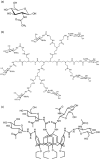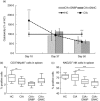Collagen-induced arthritis: severity and immune response attenuation using multivalent N-acetyl glucosamine
- PMID: 24588081
- PMCID: PMC4089161
- DOI: 10.1111/cei.12313
Collagen-induced arthritis: severity and immune response attenuation using multivalent N-acetyl glucosamine
Abstract
Rheumatoid arthritis is an autoimmunity leading to considerable impairment of quality of life. N-acetyl glucosamine (GlcNAc) has been described previously as a potent modulator of experimental arthritis in animal models and is used for osteoarthritis treatment in humans, praised for its lack of adverse effects. In this study we present a comprehensive immunological analysis of multivalent GlcNAc-terminated glycoconjugate (GC) application in the treatment of collagen-induced arthritis (CIA) and its clinical outcome. We used immunohistochemistry and FACS to describe conditions on the inflammation site. Systemic and clinical effects were evaluated by FACS, cytotoxicity assay, ELISA, cytometric bead array (CBA), RT-PCR and clinical scoring. We found reduced inflammatory infiltration, NKG2D expression on NK and suppression of T, B and antigen-presenting cells (APC) in the synovia. On the systemic level, GCs prevented the activation of monocyte- and B cell-derived APCs, the rise of TNF-α and IFN-γ levels, and subsequent type II collagen (CII)-specific IgG2a formation. Moreover, we detected an increase of anti-inflammatory IL-4 mRNA in the spleen. Similar to the synovia, the GCs caused a significant reduction of NKG2D-expressing NK cells in the spleen without influencing their lytic function. GCs effectively postponed the onset of arthritic symptoms, reduced their severity and in 18% (GN8P) and 31% (GN4C) of the cases completely prevented their appearance. Our data prove that GlcNAc glycoconjugates prevent the inflammatory response, involving proinflammatory cytokine rise, APC activation and NKG2D expression, leading to the attenuation of clinical symptoms. These results support the glycobiological approach to the treatment of collagen-induced arthritis/rheumatoid arthritis (CIA/RA) as a way of bringing new prospects for more effective therapeutic interventions.
Keywords: CIA; GlcNAc glycoconjugates; clinical scoring; cytokines; humoral response.
© 2014 British Society for Immunology.
Figures









References
-
- Feldmann M. Pathogenesis of arthritis: recent research progress. Nat Immunol. 2001;2:771–773. - PubMed
-
- Ngian GS. Rheumatoid arthritis. Aust Fam Physician. 2010;39:626–628. - PubMed
-
- Azuma K, Osaki T, Wakuda T, et al. Suppressive effects of N-acetyl-D-glucosamine on rheumatoid arthritis mouse models. Inflammation. 2012;35:1462–1465. - PubMed
-
- Alavi A, Axford JS. Sweet and sour: the impact of sugars on disease. Rheumatology (Oxf) 2008;47:760–770. - PubMed
-
- Collins ES, Galligan MC, Saldova R, et al. Glycosylation status of serum in inflammatory arthritis in response to anti-TNF treatment. Rheumatology (Oxf) 2013;52:1572–1582. - PubMed
MeSH terms
Substances
Grants and funding
LinkOut - more resources
Full Text Sources
Other Literature Sources
Medical
Miscellaneous

